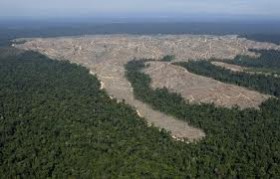Years back the IT-industry gave us a new abbreviation – WYSIWYG – “What You See Is What You Get!” At that time it was used to describe the transformation of word processors from simple “code-editors” into user interfaces that not only showed the words but also included the appearance properties such as “Bold“, “Italic” and fonts.

Today “WYSIWYG” is more relevant than ever, but this time it is about Sustainability and the way corporate processes and supply chains are set-up. True Sustainability needs transparency as a major element.
Transparency works!

Recently Asia Pulp & Paper (APP) one of the largest paper companies in the world announced an immediate end to the clearing of natural forests across its entire supply chain in Indonesia. This as a result from losing large contracts with Disney, Coca-Cola and Mattel after years of criticism over the paper company’s role in harming Indonesia’s endangered rainforests and communities.
This action pinpoints a number of interesting facts concerning Transparency;
- True sustainability needs a transparent process from “cradle-to-cradle” Companies like Disney, Coca-Cola and Mattel can never achieve a Sustainable “status” if linked with suppliers that are not.
- A transparent process needs much closer cooperation throughout the total supply-chain and will put new demands on sourcing and contracts. This will certainly lead to closer cooperation and longer contract periods in order to establish and ensure all the correct deliverables? Old sourcing-methods with very strong focus mainly on economic performance are simply not “good enough” when handling a triple bottom line process.
- Transparency drives more transparency. Customers and clients will not settle with “partly transparent” they will demand full transparency. The same goes for certification systems etc.
- The most effective way to get companies to change is to move away your business if the service doesn’t meet the standard you want, there are in most cases other companies that are eager to deliver the correct service.
Credibility in decline – Stora Enso
Another example of how transparency pushes transformation to a more sustainable world also includes a paper company, the Swedish-Finnish giant Stora Enso.
Stora Enso has earlier received very favourable reviews, ownership praise and fine appointments for their environmental and corporate social responsibility. But the reality is largely something else.

Stora Enso chose to go into an extremely complex and underdeveloped area of Guangxi in China with obvious lack of experience, and risk analysis.
To get profitability in the project Stora Enso needed planting 120,000 hectares of eucalyptus trees. After problems to acquire the necessary land the company placed demands on local authorities to “fix this”. And because they not openly could act unethically, they contracted businessmen with dubious connections to threaten the locals to sell the land as cheap as possible.
Just as in earlier exploitations by Stora Enso in Brazil and Uruguay the deforestation and the huge eucalyptus plantation in Guangxi province leads to declining water levels, along with eucalyptus leaves that fall to the ground, destroying not only areas where the trees are, but also the former arable land around it.
In addition, critical testimonies even come from within Stora Enso. Sources within the company confirms in an interview with Business Week, the situation in the South China as documented in the documentary film “Red forest hotel” by Mika Koskinen, but also tells of a company where everything is about “storytelling”, A company that sees corporate responsibility as PR, and where Lauri Peltola, who was hired in 2009 as communications manager, also manages “sustainability”.
Revelations like these can rapidly reduce asset-values and revenue, and in a transparent world, companies with “certified” sustainability routines and “spotless” reputation cannot afford to be associated with companies having this kind of doubtful behaviour.
Transparency has one more very essential positive effect
– it drives Honesty and Integrity!
…attributes that are increasingly scarce in a greedy world…
